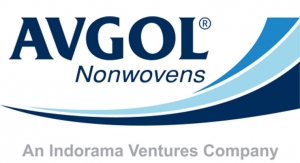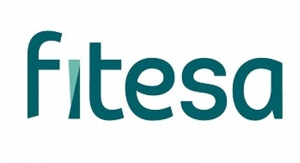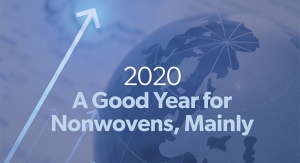09.10.13
Simpsonville, SC, U.S.
www.fitesa.com
2013 Nonwovens Sales: $697 million
Key Personnel
Silverio Baranzano, CEO; Hal Singley, CFO
Plants
Gravatai, Brazil; Lima, Peru; San Jose Iterbide, Mexico; Simpsonville, SC, U.S.; Green Bay, WI, U.S.; Washougal, WA, U.S.; Norrkoping, Sweden; Peine, Germany; Trezzano Rosa, Italy; Tianjin, China
Processes
Spunbond, SMS, bicomponent spunbond and SMS, meltblown, carded (chemical bonded, thermal bonded, air through bonded), airlaid, laminates
Major Markets
Hygiene, medical and industrial specialties (filtration, agricultural, sorbent)
Sales increased 11.7% to $697 million at Fitesa. The company shot to its position among the top 10 nonwovens producers in late 2011 when it purchased the hygiene-related assets of former joint venture partner Fiberweb for $286 million. This acquisition, combined with Fitesa’s existing businesses, created a global player in the hygiene market with assets in South, Central and North America, Europe and Asia.
“While we serve the medical and industrial specialties markets, Fitesa is focused on the hygiene market and our customers,” says Ray Dunleavy, market strategy and business development director. “This single-minded focus guides our choice of investments, product development projects and the business decisions we make every day. As long as we do this with excellence in support of our customers, we will grow our position in the market.”
Currently, Fitesa has spunbond and spunmelt operations in Simpsonville, SC and Washougal, WA in the U.S. and also in Mexico, Brazil, Peru, Germany, Sweden and Italy as well as carded operations in Simpsonville and Green Bay, WI and Brazil and an airlaid operation in China serving the feminine hygiene market. Additionally, the company is adding a carded operation in China and expanding capacity in Simpsonville, where a new line should be fully functional in 2015 and nearly double capacity at the site. In Europe, the company expects a new line, which will serve both Eastern and Western markets, to be fully operational in the first half of 2015.
Dunleavy says Fitesa continues to evaluate opportunities to serve hygiene manufacturers in other emerging markets. “Latin America is a growing market for baby diapers and thus an important region for Fitesa,” he says. “We currently serve the East and West coasts of South America from facilities in south Brazil and Lima, Peru and serve customers in Central America and Mexico from our factory in San Jose Iterbide.”
In May, the company said it would add 45,000 tons of spunmelt in South and Central America but remained mum on the exact locations. Executives did say, however, that the first stages of this investment should be complete in early 2015 and the final stages should be complete by the end of 2016. They will cover both the east and west coasts of South America as well as Central America and Mexico.
Dunleavy says that growth in demand for baby diapers has continued in line with expectations in spite of the fact that there has been some dampening of economic growth in the region.
“In the short-term, we are investing in new capacity to support the needs of our customers in existing markets while innovating with new products that deliver added value and differentiation,” says Dunleavy. “For the longer term, we will expand our business geographically in support of our customers when opportunities emerge.”
www.fitesa.com
2013 Nonwovens Sales: $697 million
Key Personnel
Silverio Baranzano, CEO; Hal Singley, CFO
Plants
Gravatai, Brazil; Lima, Peru; San Jose Iterbide, Mexico; Simpsonville, SC, U.S.; Green Bay, WI, U.S.; Washougal, WA, U.S.; Norrkoping, Sweden; Peine, Germany; Trezzano Rosa, Italy; Tianjin, China
Processes
Spunbond, SMS, bicomponent spunbond and SMS, meltblown, carded (chemical bonded, thermal bonded, air through bonded), airlaid, laminates
Major Markets
Hygiene, medical and industrial specialties (filtration, agricultural, sorbent)
Sales increased 11.7% to $697 million at Fitesa. The company shot to its position among the top 10 nonwovens producers in late 2011 when it purchased the hygiene-related assets of former joint venture partner Fiberweb for $286 million. This acquisition, combined with Fitesa’s existing businesses, created a global player in the hygiene market with assets in South, Central and North America, Europe and Asia.
“While we serve the medical and industrial specialties markets, Fitesa is focused on the hygiene market and our customers,” says Ray Dunleavy, market strategy and business development director. “This single-minded focus guides our choice of investments, product development projects and the business decisions we make every day. As long as we do this with excellence in support of our customers, we will grow our position in the market.”
Currently, Fitesa has spunbond and spunmelt operations in Simpsonville, SC and Washougal, WA in the U.S. and also in Mexico, Brazil, Peru, Germany, Sweden and Italy as well as carded operations in Simpsonville and Green Bay, WI and Brazil and an airlaid operation in China serving the feminine hygiene market. Additionally, the company is adding a carded operation in China and expanding capacity in Simpsonville, where a new line should be fully functional in 2015 and nearly double capacity at the site. In Europe, the company expects a new line, which will serve both Eastern and Western markets, to be fully operational in the first half of 2015.
Dunleavy says Fitesa continues to evaluate opportunities to serve hygiene manufacturers in other emerging markets. “Latin America is a growing market for baby diapers and thus an important region for Fitesa,” he says. “We currently serve the East and West coasts of South America from facilities in south Brazil and Lima, Peru and serve customers in Central America and Mexico from our factory in San Jose Iterbide.”
In May, the company said it would add 45,000 tons of spunmelt in South and Central America but remained mum on the exact locations. Executives did say, however, that the first stages of this investment should be complete in early 2015 and the final stages should be complete by the end of 2016. They will cover both the east and west coasts of South America as well as Central America and Mexico.
Dunleavy says that growth in demand for baby diapers has continued in line with expectations in spite of the fact that there has been some dampening of economic growth in the region.
“In the short-term, we are investing in new capacity to support the needs of our customers in existing markets while innovating with new products that deliver added value and differentiation,” says Dunleavy. “For the longer term, we will expand our business geographically in support of our customers when opportunities emerge.”










